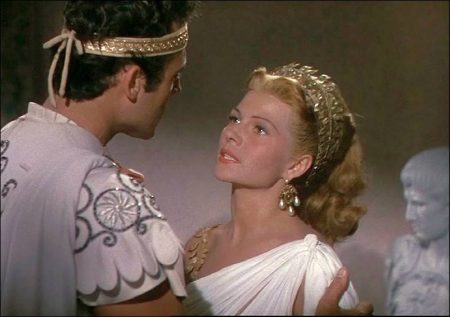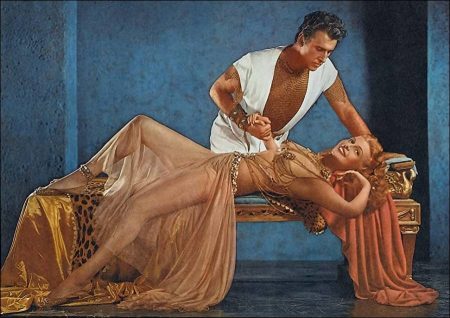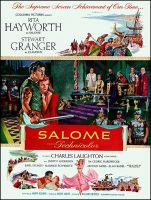Taglines: Passion and Pageantry… Unparalleled in all the pages of love and evil!
Salome movie storyline. In the reign of Tiberius Caesar (Sir Cedric Hardwicke), Gallilean prophet John the Baptist (Alan Badel) preaches against King Herod (Charles Laughton) and Queen Herodias (Dame Judith Anderson). The latter wants John dead, but Herod fears to harm him due to a prophecy. Enter beautiful Princess Salome (Rita Hayworth), Herod’s long-absent stepdaughter. Herodias sees the King’s dawning lust for Salome as her means of bending the King to her will. But Salome and her lover Claudius (Stewart Granger) are (contrary to Scripture) nearing conversion to the new religion. And the famous climactic dance turns out to have unexpected implications.
Salome is a 1953 American Drama Biblical film directed by William Dieterle and produced by Buddy Adler from a screenplay by Harry Kleiner and Jesse Lasky Jr. The music score was by George Duning, the dance music by Daniele Amfitheatrof and the cinematography by Charles Lang. Rita Hayworth’s costumes were designed by Jean Louis. Hayworth’s dances for this film were choreographed by Valerie Bettis. This film was the last produced by Hayworth’s production company, the Beckworth Corporation. The film stars Rita Hayworth as Salome, as well as Stewart Granger, Charles Laughton and Judith Anderson, with Cedric Hardwicke, Alan Badel and Basil Sydney.
The original title of the film was Salome – Dance of the Seven Veils. The film was based on the book The Good Tidings by William Sidney; Robert Ardrey wrote the first script. It was made for Hayworth’s own company, Beckworth Productions, for Columbia Release. According to her biographers, Hayworth’s erotic Dance of the Seven Veils routine was “the most demanding of her entire career”, necessitating “endless takes and retakes”.
About the Story
Although based on the New Testament story, the film does not follow the Biblical text and is highly fictionalized, critically passing the blame of John the Baptist’s death wholly upon her mother.
In Galilee, during the rule of Rome’s Tiberius Caesar (Cedric Hardwicke), King Herod (Charles Laughton) and Queen Herodias (Judith Anderson) sit on the throne and are condemned by a prophet known as John the Baptist (Alan Badel). Herodias resents John’s denunciation of her marriage to the king, her former husband’s brother, for which John labels her an adulteress. The king is not pleased with the Baptist condemning his rule, but fears he will face the same fate his father, the elder Herod, suffered after ordering the murder of firstborn males when Jesus was born. The prophecy states that if a king of Herod kills the Messiah, he will suffer an agonizing death. The king believes John the Baptist is the Messiah because of the mistaken belief of some peasants.
After Marcellus, nephew of Caesar, petitions his uncle to marry Salome, he receives a message stating that he is forbidden to marry a “barbarian.” Salome is also sent a message stating that she is banished from Rome for seeking to rise above her station, and will be escorted back to Galilee, despite having lived in Rome since childhood. When Marcellus does nothing to protest Caesar’s decree, she declares that she shall never love another Roman.
On the boat escorting her home, Salome meets Claudius, a Roman soldier assigned to the palace of Herod. He is amused by her haughty behavior and thwarts her attempt to order him around when she demands to use drinking water instead of sea water for her bath aboard the ship. When he brings sea water instead, she slaps him. He interrupts her angry tirade by stealing a long kiss, which shocks her.
Queen Herodias greets her daughter warmly when she arrives at the palace, and becomes aware of the lecherous intentions of the king, who marvels at the beauty of his stepdaughter/niece. The queen sends Salome away and consults with her advisor, who agrees that the queen can use the king’s desire for Salome for her own benefit.
Meanwhile, Salome sneaks into the marketplace with several servants to hear John the Baptist speak. When he calls her mother an adulteress, she repudiates him, inadvertently revealing her identity. She is then is spared from the angry crowd by John the Baptist, who calms them and denounces violence. Salome returns to the palace, upset by what she has heard.
She implores her mother to leave Galilee with her for her safety, but Herodias claims that she is trapped in a loveless and potentially deadly marriage to the king because she wishes to preserve the throne for Salome’s sake. Although Salome does not care about the throne, Herodias insists on its importance, and exaggerates her fear of being stoned to death by John the Baptist’s followers. Knowing of Claudius’s feelings for her, Salome seductively beguiles him in an attempt to have him arrest John the Baptist to spare her mother’s potential death as an adulteress. When he refuses her request, she exits the room in anger.
Shortly after, the king decides to arrest John the Baptist, ostensibly for treason but in reality to protect him from the actions of his wife, who has attempted to have him assassinated. The trial ends with the king imprisoning John the Baptist. Salome hears that the prophet has been arrested; she thinks that Claudius did it for her, and apologizes to him for her behavior the night before. After she leaves, Claudius rushes to the king to plead for John the Baptist’s release, but is unable to persuade him. He then rushes off to Jerusalem on horseback to seek his release.
The king visits Salome, who bids Claudius farewell from the balcony, and is irritated that she pays him attention. Herod attempts to gift her a necklace, and suggests she “find pleasure in the moment.” Knowing the implications of his gift, she rejects it, reminding him that his queen is her mother. Claudius meets with Pontius Pilate in Jerusalem, who refuses to release the Baptist because he preaches against Rome, which is treasonous.
He dismisses the Baptist as a threat, and tells Claudius there are many such prophets in the land, mentioning a miracle worker in Jerusalem. Claudius confesses he is a follower of the Baptist and the religion he preaches, and attempts to persuade Pilate to join him as a champion of this new religion. Pilate relieves him from his post and forbids Claudius from returning to Galilee, but does not arrest him because of their friendship.
Salome (1953)
Directed by: William Dieterle
Starring: Rita Hayworth, Stewart Granger, Charles Laughton, Judith Anderson, Cedric Hardwicke, Alan Badel, Basil Sydney, Maurice Schwartz, Arnold Moss, Asoka, Sujata
Screenplay by: Harry Kleiner
Cinematography by: Charles Lang
Film Editing by: Viola Lawrence
Costume Design by: Jean Louis
Set Decoration by: William Kiernan
Art Direction by: John Meehan
Music by: George Duning
MPAA Rating: None.
Distributed by: Columbia Pictures
Release Date: March 24, 1953 (New York City)
Views: 293


